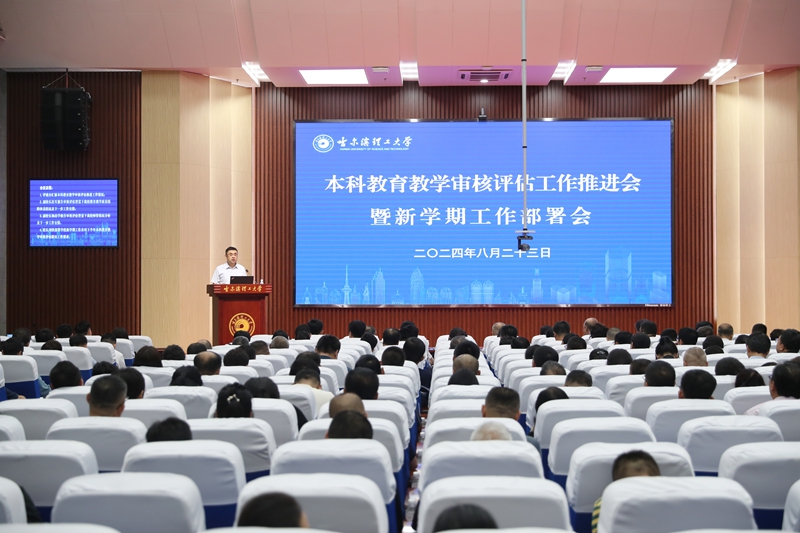To thoroughly implement the directives of the Third Plenary Session of the 20th Central Committee of the Communist Party of China, further unify thoughts and build consensus, promptly review the progress of audit and evaluation efforts, redeploy and reconfirm tasks for the subsequent phase, and simultaneously outline plans for the upcoming semester, HUST convened a meeting on August 23rd afternoon in the lecture hall located on the fifth floor of the main academic building. This meeting served as both a progress report on the audit and evaluation of undergraduate education and teaching, and a deployment session for the new semester. Attendees included Zhao Lin, Secretary of the Party Committee, Liu Xia, President, and all other university executives. The meeting was presided over by the Vice President.
President Liu Xia reviewed and summarized the achievements in various aspects in the first half of this year, including undergraduate admissions, talent recruitment, scientific and technological achievements, the development of the Academy of Engineering Excellence, the construction of key laboratories, asset management, and logistical maintenance and renovation. Furthermore, he outlined the requirements for the audit and evaluation of undergraduate education and teaching: firstly, adhere to a problem-oriented approach and promptly address any quantitative indicators that have not met the standards in the audit and evaluation. Secondly, clarify work boundaries and define responsibilities. Thirdly, pool wisdom and efforts to collaboratively advance work.
At the meeting, President Liu Xia outlined the key tasks for the following semester. He emphasized that the current audit and evaluation work has reached a critical phase, and the quality and efficiency of the evaluation and construction work will be crucial in successfully completing the “last mile” of the audit and evaluation. Guided by the spirit of the Third Plenary Session of the 20th Central Committee of the Communist Party of China, everyone of our university must act with a strong sense of responsibility and mission. We should fully mobilize active participation of teachers, students, and staff in the evaluation work, and commit to the self-evaluation and self-improvement work with a good mental state. It is necessary to coordinate and balance the annual key work tasks, inspection rectification, and audit rectification work to ensure that all work progresses steadily and that a satisfactory report can be presented to teachers and students at the end of the year.
Vice President Yang Zhongxue delivered a report entitled “Analysis of HUST’s Faculty Situation and Next Steps for Work Arrangements in the Context of Audit and Evaluation”, providing detailed explanations on the progress of work, existing problems, and the arrangement for next steps. He also outlined detailed arrangements in five aspects: advancing the reform of grassroots academic organizations, solidly and steadily promoting team building, establishing and improving talent recruitment and cultivation mechanisms, deepening the reform of performance-based salaries within the school, and continuously improving the institutional system.
Vice President Du Jun presented a report entitled “Implementing Audit and Evaluation Requirements to Ensure Quality Assurance Work.” He addressed the topic from three perspectives: “What It Is,” “How to Evaluate,”and “How to Implement,” providing in-depth explanations for each issue. He emphasized that to effectively establish an education and teaching quality assurance system, it was necessary to further enhance awareness of quality assurance, improve the quality assurance system, solidify responsibility for quality assurance, and cultivate a culture of quality assurance.
Shen Tao, Deputy Director of the HUST’s Evaluation and Construction Office and Deputy Director of the Academic Affairs Office, reported on the progress of the undergraduate education and teaching audit and evaluation on behalf of the Evaluation and Construction Office. He provided a detailed explanation on three aspects: the progress of the audit and evaluation work, existing problems at the current stage, and the next steps in the promotion plan. He also presented a timeline for subsequent audit and evaluation tasks month by month, clarifying the work priorities and the direction for follow-up work.
In his speaking, Vice President pointed out that the meeting served as a phased summary of the audit and evaluation work and a specific arrangement for the tasks of the next stage. It was also a mobilization and deployment for the key work of the following semester. All departments should conscientiously implement the meeting’s spirit, follow the arrangements made by university leaders, and further clarify the tasks and responsibilities of each department based on the relevant issues raised by the Evaluation and Construction Office to carry out rectifications and implementations.
The meeting was held in a hybrid format combining both online and offline. Members from HUST’s Education and Teaching Supervision Committee and Education and Teaching Guidance Committee, along with university leaders at the section chief level and above, department heads, and departmental branch secretaries from the secondary schools were present in person, while cadres and teachers of Rongcheng School participated online.

